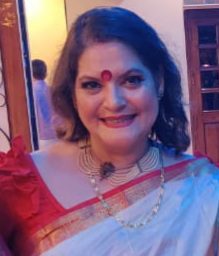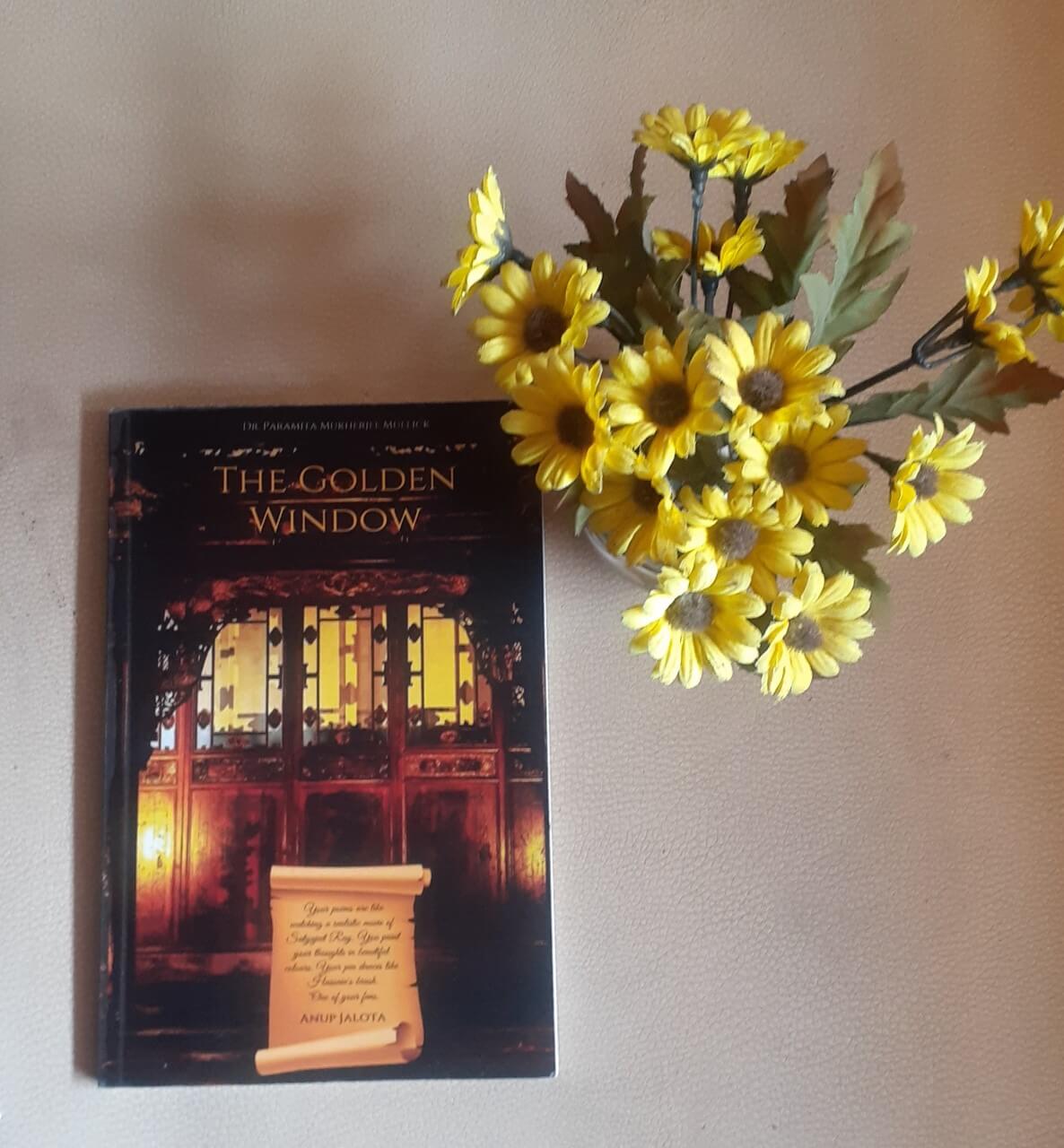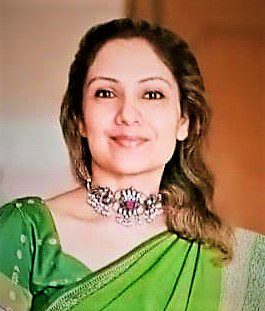Urna reviews The Golden Window, a book of poems, by Dr. Paramita Mukherjee Mullick. An exclusive for Different Truths.

Book: The Golden Window
Poet: Dr. Paramita Mukherjee Mullick
Genre: Poetry
Doors are often referred to and understood in most languages to represent an opportunity. Or a plethora of opportunities, so to speak. Doors in cultures across the globe are a well-accepted symbol of sweeping new avenues. Or a certain freshness of thought, or an approach, or a brand-new way of being.
For instance, a job well done may open doors for better opportunities.
For instance, a job well done may open doors for better opportunities. While closed doors may represent a loss, or a drying up of opportunities. Then again, a door partly open may suggest new possibilities or a potential that hasn’t been tapped into.
Yet it is the smaller, humbler window and its symbolism that has had writers, authors, artists, poets, and readers wrapped in its charm for centuries. The window and its blatant and obvious, subtle, and subdued web of magic.
Window Symbolism
The window symbolism has been used by writers from Emily Bronte, Gustave Flaubert, Edgar Allan Poe, Stephen King to Dan Brown, to name a handful. And I have often spent hours, fascinated, and intrigued by how much can be said with the help of these small, unobtrusive openings in the walls of our homes, offices, and buildings.
Now that you know about my secret obsession and a rather old, tucked-away-beneath-my-bones kind of fascination with windows, you’ll not be surprised to know about this book. A book of poems you’ll find on my bedside table.
This book is, ‘The Golden Window’, by Dr. Paramita Mukherjee Mullick.
This book is, ‘The Golden Window’, by Dr. Paramita Mukherjee Mullick. An internationally acclaimed, award-winning poet and author. A national scholar, a seasoned scientist, and an educationist with a passion for poetry, unstoppably throbbing in her veins. In fact, her poems have been translated into 31 languages, including Italian, Uzbek and Indonesian.
Golden Light
In a succinctly written preface to her book, Dr Paramita Mukherjee Mullick writes, “While I sat in my balcony, watching the setting sun, its glow on a glass skyscraper dazzled and blinded me. The reflection on the window, the golden light suddenly made me realise our heart is like a golden window, reflecting the beauty of the world”.
The cover features a vintage window framed with delicate lattice work …
The cover features a vintage window framed with delicate lattice work and suffused with a golden light. The cover also features a few lines from the veteran, internationally acclaimed singer and Bhajan Samrat, Anup Jalota. On a tiny golden yellow scroll, Anup Jalota’s beautiful words held me captive. The day I held this book in my hands, for the first time.
Anup Jalota writes, “Your poems are like watching a realistic movie of Satyajeet Ray. You paint your thoughts in beautiful colours. Your pen dances like Hussain’s brush. One of your fans”.
But before I dive deeper into the book, I must remind you to read the most evocatively written foreword by Prof. Sanjukta Dasgupta, Convenor, English Advisory Board, Sahitya Akademi, New Delhi and Professor, Department of English (Retd).
Enchanting World
Prof. Sanjukta writes, “The Golden Window tracks the poet’s journey through an enchanting world of sense perceptions that leads to the perception of a positive philosophy of life, that is gracious, generous and empathetic”. Prof. Sanjukta analyses further and lucidly explains Dr. Paramita’s craft when she writes, “Paramita zooms through the aura of skyscapes, delves through the mysteries of the forest foliage, immerses herself into the flowing rhythm of rivers, and yet finds the ground beneath her feet”.
Paramita’s sixth book, The Golden Window is neatly divided into five sections, ‘Sky’, ‘Forest’, ‘River’, ‘Land’ and ‘Abode’.
Paramita’s voice is deep and intense, though she keeps her tonality light and breezy…
Paramita’s voice is deep and intense, though she keeps her tonality light and breezy, smooth, and effortless on the surface. But you must sit with her poetry, and let her words stir their way through your heart. Beyond the edges and boundaries of what we classify as soft and natural, spontaneous, and free flowing.
Haunting Roar
Her poetry, I have come to understand, resonates with a primal, unforgettable, haunting roar that comes from a place of who she is. A powerful amalgamation of her life experiences, her observations, the relationships that have torn her apart and have held her together, with the glue of love. The dizzying highs and the guttural lows of her journey, her hard-earned wisdom and the struggles that have built and rebuilt her.
… Paramita’s words will never make you feel heavy or sucked into an airless pit.

Yet with her trademark artistry and her innate graciousness, Paramita’s words will never make you feel heavy or sucked into an airless pit. This to me is her unique voice, an extension of her personality, her essence, her spirit, her indefatigable life force.
‘Who Painted the Sky?’ from the section ‘Sky’ hungrily asks the reader many deep questions. Yet, her questions are as soft as a dragonfly. Flitting from a blade of grass to another, on a restless summer morning.
“Who painted the sky with so many colours?
The trees with different shades of green?
Who painted my heart with so many emotions?
My mind with so many multi-hues?”
Many Moons
Another personal favourite is ‘Do You Believe in Fairies’ from the section titled ‘Forest’. Here the poem traverses many moons. From the time that Paramita was a tiny girl herself, to the time that she became a mother. And as I read and re-read this poem, somewhere I felt, she is urging her readers with her fairy-dusted words, to never stop believing in fairies. A philosophy, that resonates with me too, as I navigate through grimy, insufferable adulting.
“Gobbling up Grimm’s Fairy Tales from the start
to the end.
And the wonderful fairy stories which my mother
narrated.
Fairies with gossamer dresses and flowers.
Wings as fine as sprays and shower.”
Universal Humanism
Then there’s ‘My Identity’ from the section ‘Land’. A powerful poem where Paramita introspects to tear apart shallow labels based on beliefs about race, ethnicity, religion, gender, economic class and so on. Regressive beliefs that crumble and collapse, as the poem unfolds, at the feet of the most elemental. The all-pervasive truth: universal humanism.
“Who was I when I was born?
Was I a Brahmin, a Kshatriya or a Sudra?
Who were my friends whom I chose?”
A tribute and a love poem to an all pervasive and all-encompassing lover: poetry.
And then there’s ‘Poetry, My Love’ from the last section ‘Abode’. A poem after my own heart, I must confess. A tribute and a love poem to an all pervasive and all-encompassing lover: poetry.
“I didn’t know the sunlight dances with the leaves.
Neither did I know the wonder of the golden wheat sheaves.”
What made this book carve out a special niche in my bookshelf is this: Paramita has an uncanny gift of making each poem a window. A window dazzling with a gold-kissed, silver-tinted light. That slowly shimmers in through the wrought-iron grill and curls itself up to occupy a chamber of your pulsating heart.
Meaningful Message
I feel Paramita’s ‘The Golden Window’ is trying to give us a crucial, meaningful message at a time when we are collectively witnessing many real and metaphorical doors closing on us with loud, jarring thuds. Yes, I’m talking about doors at many different levels – psychological, financial, professional, emotional, spiritual, and social.
With a pandemic ravaging our lives and hope running abysmally low, Paramita Mukherjee Mullick’s ‘The Golden Window’ reminds us that the gold-flecked light will shine forth from within. If we keep the sensory and perceptive windows of our hearts and minds open. Wide, wide open.
Visuals sourced by the reviewer






 By
By
 By
By
 By
By
 By
By
Such a well crafted review stoking the readers ‘ curiosity to delve into the book as soon as possible .
A review should make the reader read the book. I’m looking forward to hold the book in my hands and flip its pages after reading this one. It has acted as a “window” for me to enter the magical world of the book, which is what a review should do.
If I have to describe it poetically, the review flows like a river. Urna’s language is fluid, easy, simple yet sophisticated. The train of thought in her words moves like butter knife on bread. Much like what I feel the book would be.
Will place an order soon.